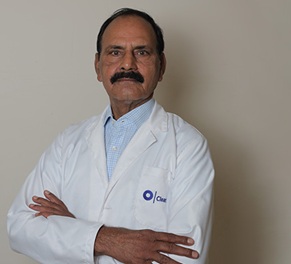Laparoscopic Cholecystectomy: Procedure Steps, Recovery
Dr. Aman Priya Khanna

Treatment Duration
45 Minutes
------ To ------60 Minutes
Treatment Cost
₹ 40,000
------ To ------₹ 80,000

Table of Contents
- What is Laparoscopic Cholecystectomy?
- Conditions Treated with Laparoscopic Cholecystectomy
- Benefits of Laparoscopic Cholecystectomy
- Before and On the Day of Laparoscopic Cholecystectomy
- Gallbladder Removal Procedure
- After Gallbladder Surgery and Recovery
- Risks and Complications of Laparoscopic Cholecystectomy
- Risks of Delaying Laparoscopic Cholecystectom
- Cost of Laparoscopic Cholecystectomy
- Takeaway
Did you know that jaundice is one of the signs of gallbladder disease? Often overlooked until symptoms become severe, conditions like gallstones can cause significant discomfort. Minimally invasive solutions like laparoscopic cholecystectomy have revolutionised the treatment of such disorders.
This blog will explore gallbladder surgery, from the procedure to the recovery. It offers insights into what patients can expect along the way. Read on!
Procedure Name | Laparoscopic Cholecystectomy |
Alternative Name | Minimally invasive gallbladder removal |
Conditions Treated | Gallstones, cholecystitis, gallbladder polyps |
Benefits of Procedure | Reduced postoperative pain, faster recovery times |
Treated By | General Surgeon |
You can check Laparoscopic Cholecystectomy Cost here.
What is Laparoscopic Cholecystectomy?
Laparoscopic cholecystectomy is a minimally invasive technique used to remove the gallbladder. It's performed to treat gallstones, inflammation, or other gallbladder conditions.
The entire procedure typically takes around 45-60 minutes to complete. The patient is given general anaesthesia to ensure they are pain-free throughout the surgery.
Anatomy of The Gallbladder
It is a small, pear-shaped organ located below the liver. The major function of the gallbladder is to store and concentrate bile (digestive fluid produced by the liver). The overview is given below.
Body: The bile is stored and concentrated here before being released into the digestive tract.
Fundus: It protrudes downward and to the right from the body of the gallbladder. Bile tends to accumulate in the fundus when the gallbladder is full.
Neck: A narrow, tubular portion that connects the gallbladder body to the cystic duct.
Laparoscopic Cholecystectomy Videos by HexaHealth
Expert Doctors (10)
NABH Accredited Hospitals (10)
Laparoscopic Cholecystectomy Success Stories


Conditions Treated with Laparoscopic Cholecystectomy
Laparoscopic cholecystectomy is primarily used to treat conditions related to the gallbladder, particularly those causing significant symptoms. It's particularly effective for:
Acute or Chronic Cholecystitis: Inflammation of the gallbladder, often caused by gallstones, can lead to pain and discomfort.
Symptomatic Cholelithiasis: The presence of gallstones causes pain, nausea, and vomiting.
Biliary Dyskinesia: Dysfunction of the gallbladder resulting in abdominal pain, mostly related to abnormal contraction or emptying.
Acalculous Cholecystitis: Swelling and irritation in the gallbladder without gallstones. It is observed in patients who are critically ill or have underlying medical conditions.
Gallstone Pancreatitis: Inflammation of the pancreas is caused by a blockage in the pancreatic duct due to gallstones.
Gallbladder Masses or Polyps: Abnormal growths in the gallbladder may require removal due to the risk of cancer or other complications.
Benefits of Laparoscopic Cholecystectomy
Laparoscopic cholecystectomy offers several benefits over traditional open surgery for gallbladder removal. The primary advantages are as follows:
Reduced post-operative pain and discomfort due to smaller incisions.
Faster recovery allows patients to return to normal activities sooner.
Lower chances of complications such as infections and hernias.
Improved cosmetic outcomes with smaller scars.
There is a lower chance of gallstones recurring due to the complete removal of the gallbladder.
Before and On the Day of Laparoscopic Cholecystectomy
Patients undergo preoperative evaluations before and on the day of gallbladder stone removal surgery and are provided with specific guidelines. This is what the process generally includes:
Before Surgery
The pre-surgery factors include consultations with the surgeon to discuss the procedure, potential risks, and expected outcomes. One may expect the following:
Parameter | Pre-Requisites |
Pre-op Assessment | Blood work, EKG (electrocardiogram), and Chest X-ray |
Risk Evaluation |
|
Anaesthesia Selection | General |
Fasting | 6 to 8 hours before surgery |
On the Day of Surgery
They will undergo final preoperative preparations upon arrival, including verifying personal and medical information. The other elements included are:
Parameter | Pre-requisites |
Consent | Mandatory |
Surgical Preparation | Ensuring a sterile environment, preparing surgical instruments |
Physical Evaluation | Assessing vital signs (pulse rate, temperature, breathing, etc.) |
IV Line | IV is used to administer fluids |
Anaesthesia Administration | General (dosage as per physical evaluation) |
Gallbladder Removal Procedure
Laparoscopic surgery usually takes around 45 to 60 minutes to complete. However, the duration may vary based on the complexity of the process. The key steps involved are:
Patient Positioning: The individual should lie on their back with arms placed perpendicular to the body or tucked at the sides.
Anaesthesia: General anaesthesia is administered to ensure they are unconscious and pain-free during the procedure.
Incision: Small incisions, usually less than an inch long, are made in the abdomen. Specialised surgical instruments and a tiny camera called a laparoscope are inserted through this cut.
Surgical Procedure: The surgeon performs the necessary steps, such as cutting, dissecting, suturing, or removing tissue or organs.
Closure: The surgical wounds are closed with sutures or surgical tape to complete the surgery.
After Gallbladder Surgery and Recovery
Following gallbladder surgery, patients are monitored closely during the initial recovery period. For a better understanding of the entire healing process, please see below.
The Recovery Process in Hospital
Laparoscopic surgery is an outpatient procedure. Patients can expect to be discharged once they can eat, drink, and walk comfortably without experiencing pain. The focus during this time is on pain management and monitoring for potential complications. The other factors include:
Evaluating vital signs like blood pressure and temperature.
Introduction of a clear liquid diet, patients have solid foods after a few days post-discharge, as per doctor’s advice. 11
Recovery Process/Expectation After Hospital Discharge
It takes around one week to fully recover from gallbladder stone removal, during which patients should strictly adhere to doctor’s guidelines.
Adherence to dietary restrictions, such as avoiding fatty or greasy foods, to prevent digestive discomfort. Eating low-fat foods like oatmeal and brown rice are recommended.
Avoid alcohol for at least two days after surgery.
Regular monitoring of incision sites for signs of infection.
Resume normal activities gradually, as tolerated and advised
First Follow-Up Appointment
The first visit to the doctor will be scheduled 1-2 weeks after the surgery. This appointment is crucial for assessing the patient's recovery progress and addressing concerns. It determines the need for further treatment or follow-up care.
The healthcare provider may conduct postoperative examinations, such as a complete blood count (CBC) and ultrasound.
Evaluation of incision sites and overall healing progress.
Discussion of any concerning symptoms.
Review of post-operative instructions and recommendations for ongoing care.
Risks and Complications of Laparoscopic Cholecystectomy
While laparoscopic cholecystectomy is generally considered safe, there is a small chance of experiencing complications. The potential risks are:
Bleeding: Although uncommon, there's a risk of this during or after surgery, which may require additional interventions.
Infection: Issues at the incision sites or within the abdominal cavity can occur, leading to fever, pain, or other symptoms.
Injury to Surrounding Organs: Accidental damage to nearby structures such as the bile duct, intestines, or blood vessels may occur.
Blood Clots: Prolonged immobility during and after treatment may enhance the risk of developing this condition in the legs or lungs.
When to Consult a Doctor?
To prevent complications after laparoscopic cholecystectomy, it is crucial to get any emerging issues or concerns addressed. It's important to consult a doctor if patients experience any of the following:
Persistent or worsening abdominal pain
Fever (over 101 degrees) or chills
Redness, swelling, or drainage at the incision sites
Persistent nausea or vomiting
Difficulty breathing or chest pain
Risks of Delaying Laparoscopic Cholecystectom
Delaying laparoscopic cholecystectomy can lead to worsening symptoms and increase the risk of complications. The major issues involved are:
Inflamed gallbladders can lead to complications such as infection, bile duct obstruction, or pancreatitis.
Gallstones may increase in size or number, leading to severe pain.
Decreased effectiveness of surgical and non-surgical treatments over time.
Persistent discomfort and nausea may affect appetite, sleep, and daily activities, leading to deteriorated quality of life.
Cost of Laparoscopic Cholecystectomy
The cost of laparoscopic cholecystectomy can vary widely depending on a number of factors. Some healthcare providers or facilities may offer financial assistance programs to help manage the expenses. The general overview is given below.
Treatment | Estimated Cost Range |
Laparoscopic Cholecystectomy | ₹ 40,000 to ₹ 80,000 |
Note: The estimated numbers above can increase or decrease significantly. Contact HexaHealth for accurate pricing information.
Factors that may affect the cost of gallbladder stone operation include:
Geographical Location: The cost can differ significantly due to the region where the surgery is performed. Urban areas generally have higher expenses than rural areas.
Healthcare Provider or Facility: Different hospitals or surgical centres may have varying pricing structures. This can be based on factors such as reputation, facilities, and expertise.
Pre-operative Tests: Additional diagnostic examinations or imaging studies required before the treatment can add to the total bill.
Health Insurance: The extent of coverage, including deductibles and out-of-pocket expenses, can influence the amount paid by the patient.
Takeaway
For those facing gallbladder issues, laparoscopic cholecystectomy offers a minimally invasive solution with reduced pain and faster recovery. By removing the gallbladder, this procedure not only restores comfort but also prevents potential complications.
At HexaHealth, we understand the importance of accessible healthcare solutions. Through our network of trusted professionals, individuals seeking gallbladder surgery may receive top-quality care. Get in touch!
Suggested Reads
| Open Cholecystectomy |
Gallstones |
| How to Remove Gallstones Naturally |
Difference Between Kidney Stone and Gallstone |
Frequently Asked Questions (FAQ)
What is a laparoscopic cholecystectomy?
A laparoscopic cholecystectomy is the minimally invasive surgical procedure used to remove the gallbladder. It is performed to treat gallstones, cholecystitis, and other gallbladder conditions.
How is gallbladder removal (cholecystectomy) performed?
Gallbladder removal, or cholecystectomy, is performed laparoscopically using small incisions in the abdomen. Through the cuts, specialised surgical tools and a camera are inserted to remove the gallbladder.
What are the steps involved in laparoscopic cholecystectomy?
Laparoscopic cholecystectomy is a simple surgical technique used to remove the gallbladder. It involves several key steps, including:
The patient is given general anaesthesia.
Small incisions are made in the abdomen to insert surgical instruments and a camera.
The surgeon carefully dissects and removes the gallbladder.
Incisions are closed with sutures or surgical tape.
What is the recovery time after laparoscopic cholecystectomy?
Most patients may expect a shorter recovery duration after laparoscopic cholecystectomy, usually around 1 week. During this period, they may experience mild discomfort and fatigue.
How long does it take to recover from gallbladder surgery?
Recovery from gallbladder surgery usually takes about 1 week for laparoscopic cholecystectomy. Most patients are able to resume normal activities within this timeframe. However, individual healing times may vary depending on the extent of the treatment.
What are the benefits of laparoscopic over traditional cholecystectomy?
Laparoscopic cholecystectomy offers several advantages over traditional open cholecystectomy, making it the preferred approach. These include:
Reduced post-operative pain and discomfort
Faster recovery times and shorter hospital stays
Smaller incisions and improved cosmetic outcomes
Lower risk of complications such as infection and hernias
What are the risks and complications of laparoscopic cholecystectomy?
While laparoscopic cholecystectomy is generally safe, there are potential risks involved. The most common complications are:
Bleeding, infection, or injury to surrounding organs during surgery
Bile leakage or bile duct injury
Blood clots or complications related to anaesthesia
Can gallstones return after laparoscopic cholecystectomy?
No, gallstones cannot return after laparoscopic cholecystectomy. This is because the gallbladder, which is the primary site for gallstone formation, is completely removed.
Is gallbladder stone removal always done through laparoscopic surgery?
Gallbladder stone removal is not always done through laparoscopic surgery. It can also be performed using other methods, such as open surgery. The choice of treatment depends on factors such as the size and number of stones, as well as the presence of complications.
What foods should I avoid after gallbladder surgery?
After gallbladder surgery, it's essential to make dietary adjustments to support digestion and prevent discomfort. Avoiding these can help minimise digestive symptoms:
Fatty, greasy, or fried foods
Anything spicy and heavy sauces
High-fat dairy products
Beans, cabbage, and carbonated beverages
Can I resume normal activities after laparoscopic cholecystectomy?
Most patients can gradually resume normal activities a week after laparoscopic cholecystectomy. However, it's essential to listen to your body and avoid strenuous activities until cleared by your surgeon.
How soon can I return to work after gallbladder surgery?
Most people can return to work a week after laparoscopic gallbladder surgery. This would depend on the type of job and individual recovery. Light-duty work may be possible sooner, while jobs requiring heavy lifting may require 6 to 8 weeks.
Are there any long-term effects of gallbladder removal?
Gallbladder removal, or cholecystectomy, is generally safe and effective. However, it can lead to some long-term effects like:
Changes in bowel habits, such as diarrhoea
Increased risk of bile reflux, where bile flows back into the stomach
Potential for weight gain or difficulty managing it
Can laparoscopic cholecystectomy be performed on elderly patients?
Yes, laparoscopic cholecystectomy can be performed on elderly patients. However, careful consideration of individual health status and potential risks is necessary.
Can gallbladder removal cause problems later in life?
Gallbladder removal is generally safe. However, some individuals may experience long-term issues such as:
Diarrhoea
Flatulence (gas buildup in the digestive system)
Increased risk of bile reflux
Can I get stones after gallbladder removal?
After gallbladder removal, 1 in 7 individuals may develop gallstones in the bile ducts. This condition, known as choledocholithiasis, may require further treatment to address complications.
Is gallbladder removal surgery covered under insurance?
In many cases, gallbladder removal surgery is covered by health insurance plans. However, coverage may vary depending on individual policies, deductibles, and co-payments. It's essential to check with HexaHealth for specific details.
How much does lap cholecystectomy cost?
The lap cholecystectomy cost starts from ₹ 40,000 and can go as high as ₹ 80,000. Please note that these numbers are estimated. For accurate information, contact HexaHealth experts.
Laparoscopic Cholecystectomy Cost Videos
More Treatment options
References
All the articles on HexaHealth are supported by verified medically-recognized sources such as; peer-reviewed academic research papers, research institutions, and medical journals. Our medical reviewers also check references of the articles to prioritize accuracy and relevance. Refer to our detailed editorial policy for more information.
- Hassler KR, Collins JT, Philip K, Jones MW. Laparoscopic Cholecystectomy [Internet]. PubMed. Treasure Island (FL): StatPearls Publishing; 2022.

- Cholecystectomy (gallbladder removal) - Mayo Clinic [Internet]. www.mayoclinic.org.

- What To Know About Cholecystectomy [Internet]. Cleveland Clinic.

- Gall Bladder Pre-Op [Internet]. Division of Gastrointestinal Surgery.

- Miller TE, Myles PS. Perioperative Fluid Therapy for Major Surgery. Anesthesiology [Internet]. 2019 May;130(5):825–32.

- Cholecystectomy (gallbladder removal) - Mayo Clinic [Internet]. www.mayoclinic.org.

- Laparoscopic Cholecystectomy Cost in India - Calculate Estimated Cost [Internet]. www.hexahealth.com. [cited 2024 Apr 20].

- Unisa S, Jagannath P, Dhir V, Khandelwal C, Sarangi L, Roy TK. Population-based study to estimate prevalence and determine risk factors of gallbladder diseases in the rural Gangetic basin of North India. HPB: the official journal of the International Hepato Pancreato Biliary Association [Internet].

- Gallbladder removal - Recovery [Internet]. nhs.uk. 2017.

- Choledocholithiasis Information | Mount Sinai - New York [Internet]. Mount Sinai Health System. [cited 2024 Apr 20].

- Contributors WE. What to Know About Diet After Gallbladder Surgery [Internet]. WebMD.

Last Updated on: 20 April 2024
Reviewer

Dr. Aman Priya Khanna
MBBS, DNB General Surgery, FMAS, FIAGES, FALS Bariatric, MNAMS General Surgery
13 Years Experience
Dr Aman Priya Khanna is a highly experienced and National Board–Certified Laparoscopic, GI, and Bariatric Surgeon with over 13 years of clinical expertise.
He is widely regarded as one of the best bariatric surgeons in Ahmedabad, ...View More
Author

Sparshi Srivastava
B.Tech Biotechnology (Bansal Institute of Engineering and Technology, Lucknow)
2 Years Experience
An ardent reader, graduated in B.Tech Biotechnology. She was previously associated with medical sciences secondary research and writing. With a keen interest and curiosity-driven approach, she has been able to cont...View More
Laparoscopic Cholecystectomy in Top Cities
Laparoscopic Cholecystectomy Cost in Top Cities
Latest Health Articles




































